Interview: Rachel Feldberg, Director of Ilkley Literature Festival
August 29, 2015
The Ilkley Literature Festival is one of the biggest cultural events in the region, and the second oldest such festival in the country. Established for over 40 years, it has become a fixture in the calendar, attracting some of the biggest names in all genres of writing to the spa town in October.
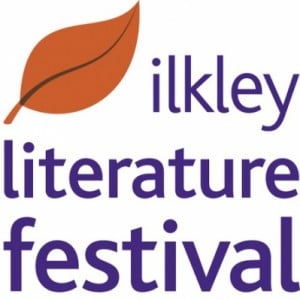
Ilkley Literature Festival
For the last 12 years, the festival has been overseen by Rachel Feldberg, former Artistic Director of Red Ladder Theatre Company. As the festival gears up for its 43rd outing, continuing to go from strength to strength, TSOTA caught up with the person behind it all.
TSOTA: Your background was in theatre. How did you get into theatre and the arts?
RF: I started out as a director and writer, and that led me to Red Ladder in 1985. What I did was commission and dramaturge new work. I was lucky to work with some fantastic writers, and new writing was always an interest, so you see how that translates into working at a literature festival.
I left Red Ladder in 1993. I worked as a freelance director, project manager and trainer with arts organisations, and did some writing of my own. I came to Ilkley in January 2003. The first festival I programmed and delivered was October 2003, Ilkley’s 30th anniversary.
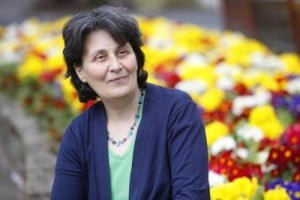
TSOTA: Why does a literature festival work in Ilkley, and why has it lasted for so long?
RF: Ilkley is the second-oldest literature festival in the country, after Cheltenham. It was started by a group of people who lived in Ilkley. It started with that local enthusiasm and impetus. The festival has managed to maintain that local connection, at the same time as having a wider spread regionally.
Another point is that Ilkley is an incredibly beautiful place. One of the things that always works for the festival is if you have it somewhere that people have always wanted to visit.
In 1973, they established a festival that was diverse in content. From the start, the festival commissioned work. That’s one of the things that has sustained the festival through 40 years.
TSOTA: What is the balance between being a festival in the community and one for the community?
RF: It’s important that local people feel it’s their festival. I don’t think there’s been a year we haven’t involved local schools. Local people are involved as stewards. The current chair, vice-chair and company secretary all live in Ilkley. We also make sure there are things everyone can enjoy: the children’s book trail; free events; events on the bandstand…
There are a lot of participatory events. Our poetry networking event is an opportunity for anyone to read their poetry. We have a review team: we run a workshop for people and provide them with press tickets, so they can review events. We have young people doing the same thing, where they interview authors and team members, and literally create a festival newspaper in a day, with the help of a journalist.
Part of our job is to nurture emerging talent. There’s the poetry banquet, where anyone can come along and read. There’s the mushaira, a multi-lingual poetry event. People read in Urdu and Hindi, in Bengali, in English, and we have a feast half-way through. That’s one of my favourite festival events and attracts some of the best poets of South Asian heritage in Northern England.
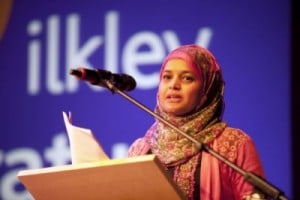
TSOTA: Ilkley has an image of being affluent and genteel, yet you come from a background in radical theatre. Was there any anxiety about the fit?
RF: My work has always had access as a focus. I’ve always been passionate about ensuring that people of all ages and backgrounds have access to the arts. Ilkley has enormous depth and breadth, and ILF has been culturally diverse from the mid-1970s. What I inherited was an organisation doing a lot of the things I believed in.
The other thing is that I have multiple interests. I have a strong interest in the visual arts and in music. I love Roman history, and here I am working in a town that had a Roman settlement. Ilkley is a really good fit for me.
TSOTA: ILF is committed to certain things – Words in the City, work in inner-city schools, featuring artists of South Asian heritage…. Were these inherited or something you developed?
RF: Both! At our 40th anniversary, we created an exhibition about what the festival had done. It was fascinating that in such and such a period, we were working in inner-city schools in Bradford. During the 25th anniversary, the festival worked with Benjamin Zephaniah in Bradford, so I don’t know if I can claim the credit, but the work is important to us. We’re lucky the Arts Council supports it.
In terms of Words in the City, being in the centre of Bradford means anyone can just drop in and take part – that’s very enjoyable for us, and the feedback from parents and children is they really love it. We have children saying, “This has been the best day of my life.” An 8 year old talking about the best day of her life being because she had been writing poems! That shows what potential Bradford’s got.
TSOTA: The ILF fought successfully to retain a relatively small grant from Bradford Council. Why was this so important?
RF: Although it may seem small, that money is incredibly important and irreplaceable. Even if you lose £11,000, which in a total turnover of £450,000 doesn’t seem huge, it’s going to be an enormous struggle. More importantly, it enables you to lever other money. Having the financial support of your local authority is vital in that. If they had withdrawn it, working in Bradford would have become extremely difficult.
We were lucky that we had the resources to say to supporters, this needs fighting. Bradford Council was inundated! ILF supporters tend to be great letter and email writers, and Bradford Council listened. Bradford, like many cities in the north, needs all the good publicity it can get. One thing we guarantee is positive national attention. The Council never wanted to cut us any more than the rest of its services. It was a very happy and positive outcome.
One sister works for the health service and another used to work in education. I understand you’ve got to prioritise those services, but if we don’t put the arts in, you end up with a society in which we don’t have any art, and we’re all poorer. The arts have a real and important value. They’re not some silly, frothy thing giving Saturday night entertainment.
TSOTA: What work is involved in putting together the Festival?
RF: We have an amazing team, all of whom, including myself, are part time, other than one member, a full-time administrator. Our year begins the week after the Festival finishes, when we begin gathering feedback, evaluation and statistics. That leads into planning in January, then we’re programming until the end of June. We open bookings at the end of August and have the main festival in October, having delivered Words in the City in June.
How you programme is dependent on who’s written a book, and is willing to speak. Even if you are desperate to have an author, if they haven’t got a new book out, they’re unlikely to speak at a festival, because they’re probably busy writing another. If they have a book out, it’s possible they don’t like doing events, or are touring the States or Australia. It’s both exciting and frustrating, but there’s also the opportunity to create exciting events. That is one of the most exciting aspects of what we do.
When the programme is locked down, my job is delivering to 35,000 people something they love, with an amazing team. You can’t have better than that!
TSOTA: Do you look for themes to flesh out, or do themes emerge from the programme?
RF: It’s a mixture. There are strong Bronte around at the moment. We’re doing a series exploring the First World War, so this year our theme is hidden voices, looking at the experience of black and Asian soldiers.
There are also themes that emerge as you get a feel of books coming out, and a sense of the zeitgeist. This year there are many books reflecting on what kind of future can we have. Once you see a theme emerging with strong writing attached, you can start building on it.
TSOTA: In your time at ILF, are there any events that have particularly stood out for you, either in terms of personal pleasure, or satisfaction at having pulled off a coup?
RF: Bringing Maya Angelou to the festival has to be one of the most remarkable events. That was incredibly exciting and complicated. I was proud of the series we did to mark the bicentenary of the abolition of the slave trade.
For pleasure, it has to be Alan Bennett. People forget he’s not only one of the UK’s best playwrights, but also a fantastic reader.
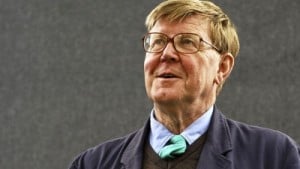
I worked with Richard Hoggart when he was very elderly. We asked was there anything we could get him. He said the thing that would be most wonderful, would be a curd tart from Betty’s. That’s what his heart really desired. Those moments are very special indeed!
TSOTA: What are you most looking forward to this year?
RF: All sorts of things. Vince Cable talking about the economy. Jackie Kay reading her poetry. Jane Smiley, the Pulitzer Prize-winning American author. Caryl Phillips, who’s coming with his novel inspired by Wuthering Heights.
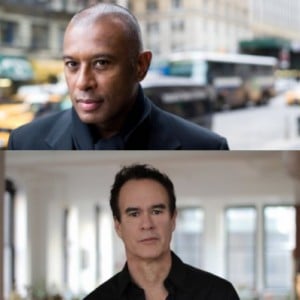
Caryl Phillips and Robert Antoni
Then there are people reflecting on our future. Danny Dorling, the Oxford geography don, is talking about his vision for the future. Oliver Morton talking about geo-engineering – if we’ve got global warming, what are we going to do about it?
Because I’m an ex-theatre person, Testament’s piece inspired by William Blake is going to be big. You have to go to the storyteller, Nick Hennessey, working on the Finnish epic. It’s called Fire in the North Sky, and he’s got outstanding Finnish musicians with him.
We’ve asked Rommi Smith, the poet and playwright, to do a reading of The Wasteland. We’re involved with a project with Professor Mike Tooby, who’s preparing an exhibition for Turner Contemporary inspired by Eliot’s Wasteland. I’ve seen other people read The Wasteland, but this is electrifying.
TSOTA: Anything that might escape notice as a ‘hidden gem’?
RF: I would say Petina Gappah, a Granta young novelist. I think she’s fascinating. The strand about the future of the book is very interesting. There’s writing from Latvia. We offer people something you’re going to have to travel a long way otherwise to have any part of, so I think grabbing that opportunity is important.
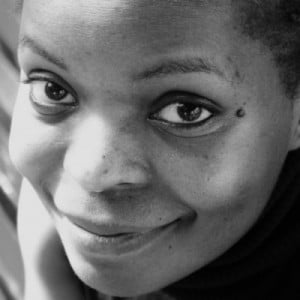
Petina Gappah
John Agard, the poet, is doing a performance piece, Roll Over Atlantic. John is always completely mesmerising as a performer. I shall definitely be sneaking into the back of that one.
Ilkley Literature Festival runs from 2-18 October. Tickets go on sale to the public from 1 September.
Filed under: Written & Spoken Word
Tagged with: Alan Bennett, Benjamin Zephaniah, Betty's, Blake Remixed, Bradford, Caryl Phillips, Danny Dorling, ilkley, Ilkley Literature Festival, Jackie Kay, Jane Smiley, John Agard, literature, Maya Angelou, Mike Tooby, mushaira, Nick Hennessey, Oliver Morton, Petina Gappah, poetry, rachel feldberg, Red Ladder, Richard Hoggart, Rommi Smith, T.S. Eliot, Testament, The Wasteland, Vince Cable, Words in the City, writing
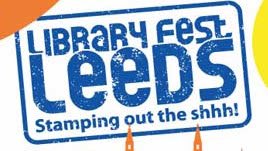
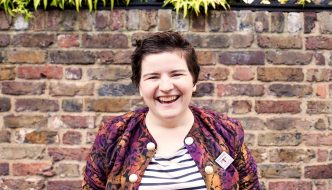
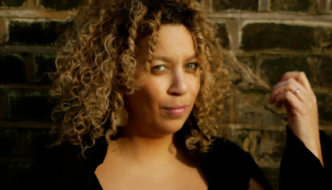
Comments